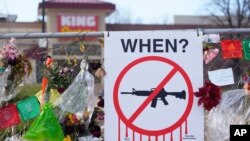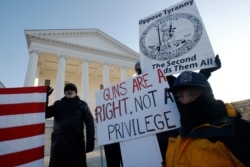In the wake of last month's deadly shootings in Colorado and Georgia, President Joe Biden recently announced six executive orders his administration believes will lead to some reduction in gun violence.
The United States is unique among developed nations in the high number of gun-related deaths in the country. While nearly all Americans understand there's a problem, there are widely differing views on what's causing the epidemic of deaths, and how to solve it.
Those contrasting opinions are on full display when discussing the March 22 mass shooting at a grocery store in Boulder, Colorado that left 10 innocent people dead.
"Easy access to guns played a critical role in that shooting," explained Patrick Armstrong, whose father taught gun control law. Armstrong lives in New Orleans, Louisiana, which had the fourth-highest murder rate among large American cities in 2019.
Armstrong said it's discouraging how easy it was for the suspect in Boulder to purchase the firearms he used to end so many lives, despite having several past incidents that could have been grounds to disqualify him from gun ownership.
"Better gun laws, and more consistent enforcement of existing gun laws could have at least made it much more difficult for the suspect," he told VOA.
Aidan Johnston has a very different view on what caused the tragedy. He's the Director of Federal Affairs at Gun Owners of America, a gun rights organization with more than 100,000 members.
"Gun control groups spent years harassing stores [like the one in Boulder] under The Kroger Co. into banning the open carry of firearms," Johnston explained. "The corporation finally capitulated in 2019. By demanding law-abiding gun owners shop elsewhere, they turned that store into a soft target ripe for exploitation by criminals like this mass murderer."
A country divided
There are few issues more contentious in the United States than guns. A Pew Research Center poll from 2017 asked respondents what is more important, controlling gun ownership or protecting the right to own guns?
It was a near-even split with 51% favoring controlling gun ownership, 47% prioritizing protecting the right to ownership, and the remaining 2% withholding their answer.
Despite there being no clear consensus on a path forward, many of the country's leading voices leave little room for compromise.
"All gun control laws violate the Second Amendment rights of Americans," explained Johnston. "The constitutional mandate ‘shall not be infringed' does not leave any room for President Bident to arbitrarily ban or further regulate...firearms."
The case for guns
It's unlikely a debate about guns in America will take place without at least some reference to that Second Amendment to the U.S. Constitution. It reads, "A well regulated Militia, being necessary to the security of a free State, the right of the people to keep and bear Arms, shall not be infringed."
As is the case for many pro-gun advocates, that text is the heart of Mark Shreve's beliefs on the issue.
"The 2nd Amendment is an unalienable right. It isn't up for interpretation," explained Shreve, who is a former New Orleans police officer and currently teaches gun classes.
Shreve said his passion is helping his students learn how they can keep themselves from becoming victims of violent crime. An incident his wife experienced underscored the importance of this to him.
"Someone tried to carjack her car," Shreve remembered. "The guy pulled on the door handle and pounded on the window, and all she had to do was retrieve her handgun from the console and point it in the air. As soon as he saw it, he ran. But what would have happened if she didn't have the gun? Would she have been kidnapped? Raped? Murdered?"
Many pro-gun advocates point to their belief that making it more difficult to buy guns benefits criminals.
"You've got millions of responsible gun owners in America who follow the law," said Isaiah Stewart, who owns a firearms training center in New Orleans. "But if you try to take or regulate guns, you know who won't comply? Criminals. They'll still have their guns."
The case for gun control
In its 2008 decision in District of Columbia v. Heller, the Supreme Court added a statement that the right to bear arms outlined in the Second Amendment is not unlimited. The statement included "dangerous and unusual weapons" as a limitation, as well as "the possession of firearms by felons and the mentally ill."
Laura Devitt thinks this, and President Biden's executive orders are all positive steps. Devitt is a lead volunteer for the New Orleans chapter of Moms Demand Action, a national organization fighting for public safety measures they believe can protect people from gun violence. She said she became passionate about addressing gun violence after the 2012 school mass shooting in Sandy Hook, Connecticut.
"I was in labor with my first child when it happened, and I was so shaken that I was bringing a child into the world during this horrific event," she said. "I'm not against the Second Amendment. I just think we can do more to work together and end gun violence by enacting laws and closing loopholes that already have the support of lots of gun owners."
Pro-gun advocates are quick to point out that there are already hundreds of federal and state laws in existence that attempt to mitigate gun violence.
Devitt said many of those laws need to be updated.
"It's not about the number of laws that exist, it's about having the right laws," she said. "Armslist.com -- the largest online gun marketplace -- doesn't require background checks when the sale is by a private seller. But the website didn't even exist when our federal background check law was enacted 25 years ago."
In addition to bolstering background checks, those who favor gun control also point to the patchwork of state laws as evidence laws need updating.
"People like to point to Chicago as an example of how stricter gun laws lead to more gun-related crime [because only criminals are left with firearms]," Devitt said, "but what we're actually seeing is many of those guns are being traced back to neighboring states with weaker gun laws. It's why we need strong federal laws."
Reaching consensus?
Summer Gebhart's friend was murdered in Austin, Texas. She and her boyfriend got into a verbal fight at a local bar. The argument became physical when they got back to the house and ended when the man retrieved his gun from his truck and shot his girlfriend in the face.
When Gebhart thinks about what could have happened for her friend to still be alive, she looks to the world's other developed nations, and the success they've had curtailing gun violence.
"Look at Japan, Australia, Germany and Switzerland," she said. "They've all taken action -- whether it be a 28-day cooling-off period before you can buy a gun, extensive psych testing to qualify for a firearm, or a properly-locked storage case with code or key."
It's not about taking away all guns, Gebhart said, it's just about reducing the danger of gun violence.
But when Isaiah Stewart looks to other countries, he sees something different.
"They banned handguns in England," he said, "but you know what happened next? Stabbing rates went up. Now they're trying to ban knives."
Stewart is right that knife violence hit a record high in England in 2019, but he also acknowledged it's much harder to kill someone with a knife than a gun. And that's the point, according to those in favor of gun restrictions in the U.S.
Still, it doesn't change Stewart's belief that people should have the right to protect themselves. He believes President Biden's executive orders hinder law-abiding citizens' ability to do that.
"I think people who want to commit crimes are going to commit crimes and there's no stopping their desire," he said, before adding how he thinks the number of gun tragedies can be reduced. "But maybe we can focus more on training and educating responsible gun owners on how to better take care of their weapon."
Stewart noted that in New Orleans, alone, in 2017, 756 guns were reported lost or stolen, and 253 of those were recovered in the use of a crime.
Gebhart doesn't think such a limited focus on "responsible gun owners" goes nearly far enough, but she agrees it's a problem that needs addressing. It also underscores the idea that any major gun regulation will need the help of at least some of America's many gun owners to become law.
"We need good gun owners to help reduce gun harm," she said. "We won't get far without them."








